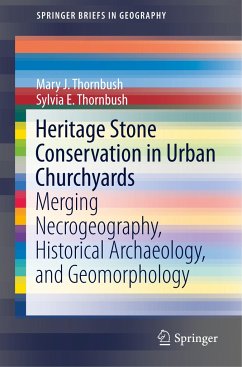This book provides a cross-disciplinary perspective on the degradation and deterioration of the cultural record encompassed by urban headstones located in parish churchyards. Its interdisciplinary approach allows the geomorphological analysis of rock weathering to be combined with the impacts on the cultural record, its interpretation, and management. In particular, by examining the impacts of air pollution on the weathering of these cultural markers, cross-temporal assessments can provide valuable information concerning the condition of the record and its sustainability potential as monuments of cultural heritage.
Churchyards located in urban settings have grown in interest for the purposes of heritage conservation research. Specifically, headstones represent part of the historical and archaeological record and are recognised as a component of historical archaeology. They are also now approached from the standpoint of heritage conservation, either as monuments or culturalstoneas well as being part of necrogeography through their address of burial and stone decay.
In this brief, headstones located in parish churchyards in England and Scotland, as part of the Anglican record for the Church of England and the Presbyterian record for the Church of Scotland, were examined using non-destructive methods based on field observations since preliminary research in 2006 as part of a decadal scale (long-term) study. This multisite investigation captures the record since the 17th century, and mainly comprises limestone (England) and sandstone (Scotland) headstone markers that still remain upright. Most studied headstones appear before the 19th century, when this study's temporal focus terminates. Seriations performed on the available record have revealed trends in style based on inscriptions, epitaphs, and motifs as well as quantified dimensions, shapes, and more.
This study represents an attempt to pictorially record cultural stone and to observe cross-temporal and spatial change at various scales. As such, it offers a valuable resource for practitioners, e.g. conservators and archaeologists, as well as for students and researchers.
Churchyards located in urban settings have grown in interest for the purposes of heritage conservation research. Specifically, headstones represent part of the historical and archaeological record and are recognised as a component of historical archaeology. They are also now approached from the standpoint of heritage conservation, either as monuments or culturalstoneas well as being part of necrogeography through their address of burial and stone decay.
In this brief, headstones located in parish churchyards in England and Scotland, as part of the Anglican record for the Church of England and the Presbyterian record for the Church of Scotland, were examined using non-destructive methods based on field observations since preliminary research in 2006 as part of a decadal scale (long-term) study. This multisite investigation captures the record since the 17th century, and mainly comprises limestone (England) and sandstone (Scotland) headstone markers that still remain upright. Most studied headstones appear before the 19th century, when this study's temporal focus terminates. Seriations performed on the available record have revealed trends in style based on inscriptions, epitaphs, and motifs as well as quantified dimensions, shapes, and more.
This study represents an attempt to pictorially record cultural stone and to observe cross-temporal and spatial change at various scales. As such, it offers a valuable resource for practitioners, e.g. conservators and archaeologists, as well as for students and researchers.








